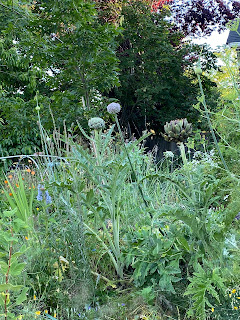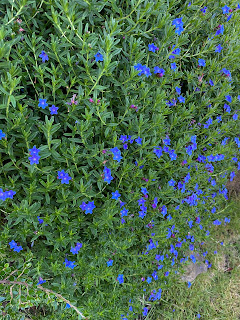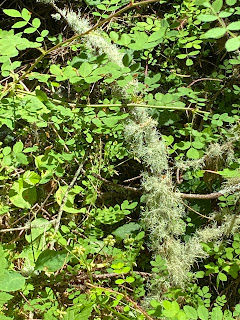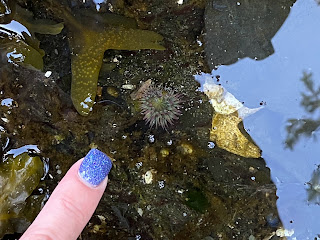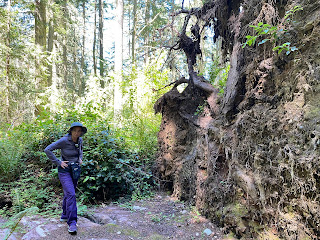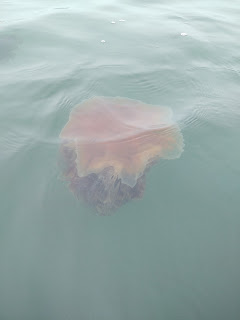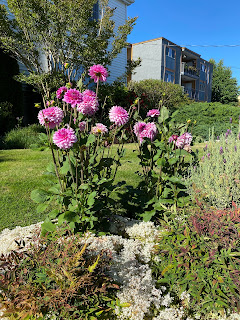Tucker Mythology
Western Spaghetti
We hadn't known each other for even a year. Tucker had turned fourteen. I'd turned fifteen. At that point, I was trying to get a handle on what was adult and what was cool. They were different things. I'd seen a few Clint Eastwood movies on late night television but, although Clint seemed sort of cool, I had no desire to emulate him. Tucker was four years away from falling in love with those films and learning the term 'Spaghetti Western.' After that, it was a term he used for the rest of his life. Usually, he said it with a delighted smile.
But that day, we were still getting to know each other. And he thought I was weird.
"What are you doing?" Tucker asked from the top of the stairs. He thumped down to my spot on the landing. "Have you lost your senses?"
"I was just curious." I'd already finished half of the sandwich. So far, it had been good.
During the Korean War and Vietnam War years, American tastes in food had gotten pretty simple. Lunch was baloney and cheese if you had the money. Dinner was meat, a potato, and a vegetable. Our country's tastes were dominated by the question, 'Is there enough?' Once World War II ended and there was, in fact, enough, tastes changed. Our parents found time to worry about the extent of their enjoyment. So did we.
I was the first person I knew to try this sandwich, banana and peanut butter together. It was something I'd read about, a bit of weirdness I'd encountered in a paragraph about Elvis. The combination had been cited as an example of how unhinged he had become. And yes, the idea of it was weird. Elvis was a strange, fat and sloppy man who smelled bad even through the television. But I guessed he had been right about peanut butter and bananas.
"How is it?" Tucker leaned against my basement wall, his head to one side.
"Needs milk," I answered. "Or honey."
"You're going to do it again?"
"Maybe." Definitely, I thought.
When I considered food, it was normally for the purpose of withholding it from myself, fasting. Or for choosing the healthiest of a few options. This time, I'd read something about food and it had turned out to be a treat. That by itself was a departure from accepting the usual boiled meat and vegetables at my table.
Boiled foods were healthy. There were no diseases on them. And they were virtuous. When I was even younger, one of our family friends had ranted in front of me - to her husband but where we could all hear - about sugary foods. She had been scandalized by my birthday. It was the concept of cake and ice cream that launched the tirade. Bad enough, she felt, that you got a treat. Either type of sweet dessert was allowable for a special occasion. Having them both together, though, was not only bad for your body but bad for your soul. You couldn't have two tasty things together. That was degeneracy. Her parents had not approved when she was young. And she didn't approve, either.
Tucker's parents would have expressed similar opinions, I think. His father, at least, had expressed the idea of food simplicity unprompted.
This started on a Saturday. Tucker came to see if I was free and I was, or near enough. We played during the middle of the day at the creek. Then, back at my house, we spent the afternoon cracking croquet balls across the lawn with my brother, took a break to eat apples and cheese sandwiches, switched to throwing baseballs, then tennis balls, and we started a game of freeze tag with frisbees (you had to stand and get hit with a frisbee) when Tucker's father called him in.
"See you tomorrow," he said.
And the next day, Sunday, was more of the same. We set up and knocked down a volleyball net, We played a game of croquet. After that, strolled around with mallets and whacked weeds that I had missed when I'd cut the grass. We reached the east side of my house, the downhill part of the yard. Tucker lifted his head.
"That smells really good." He turned toward a side window. "What is it?"
"My dad's making spaghetti." It wasn't my favorite but my dad did a good job of it. Also, he enlisted my help as a second set of hands on the dinner. The prospect of the meal usually meant I didn't complain about doing the work. At least once a month, our family got a break from boiled meat and boiled vegetables. This was one of those times, his April batch.
"That doesn't smell like spaghetti." Tucker's mouth hung open. "It smells good."
"He's making the sauce." I paused to think for a moment. It was still early, plenty of time to negotiate with our parents. "Do you want to stay for dinner?"
"I don't know," he said. "I don't like spaghetti. But the sauce smells really good."
"I guess."
'I didn't know you could make your own sauce."
As we played and talked more, I learned that spaghetti and chow mein were the only ethnic foods that Tucker knew. They both came from a can. He didn't like either of them. But his dad tolerated spaghetti, so his mother made it regularly. Well, she poured it from a Chef Boyardee can and heated it as a side dish. Spaghetti was a bland accompaniment to the real food as far as Tucker was concerned.
"You know what?" he said as we hiked back to the shed to return our mallets. "I'm going to go ask."
"Ask what?"
"If I can stay for dinner. I'll have to speak up before my mom starts cooking. Otherwise, it's no."
"Dad?" I yelled into the house. "Can Tucker stay for dinner?"
"It's spaghetti," my father shouted back. He glared at me across the kitchen. He was proud of his spaghetti. He also coveted it. Nothing irritated him more than not having enough for leftovers. With three boys in year-round athletic training, he found it hard to make batches big enough to last a few days.
"That's why," I said.
"Oh really?" He put his hand on his hip and gave a cynical smile. "Right, then. I'll add some more stewed tomatoes."
Tucker got the timing right with his parents. He obtained his required permission.
"I have to do a bunch of chores first," he added. I shrugged off the news because I'd expected it. He hadn't stayed for dinner before but Tucker had asked his parents for favors in my hearing. I knew whenever he asked for something, he would work extra chores as part of the deal. He marched back to take care of his list. I figured I might as well start the homework I'd been ignoring.
In the late afternoon, Tucker returned for more games. We hiked and played catch until the sun dipped below the tree line. Not long after, an incoming cloud front turned the sky dark.
By my family's standards, we were still early when we walked in. But Tucker turned down the offer of a peach and resisted all other snacks. Instead, he stared, fascinated, as I stirred sauce for a while. He studied my father as he added spices to the saucepan. Tucker backed off, alarmed, as we boiled and drained the pasta. He hadn't seen that before. Then, patiently, he waited.
On the plates in his home, meat and potatoes were the main features. In our setting, spaghetti was the main thing. Vegetables sat in separate bowls off to the side. You served yourself. But Tucker seemed afraid. My mother spooned him a hefty serving. He leaned in to sniff it. He grabbed his fork.
"Oh my god," Tucker said. He put his fork down after his first bite.
"What?"
He leaned back. His chewing slowed. "My god."
"Is there a problem?" my father asked.
"No. I mean, no sir." His hand returned to his fork. He twirled up another helping. "I really like it, Mr. Gallagher."
"Good." The rest of my family exchanged puzzled looks.
Our side dishes were peas with butter and spinach with butter. With us, you could eat as much as you liked, as fast as you liked, until you were full or the food ran out. Often enough, we ran out and got full at the about same time. I ate half as much spinach as spaghetti. Tucker didn't touch the spinach. He watched, slack-jawed, as the rest went about our business. By his expression, he was stunned to see my brothers and I serve ourselves. The sight affected him nearly as much as the food.
Tucker had to stop himself after three helpings. It seemed like he wanted more, really, but he was trying to be polite.
#
In our generation, Tucker's food situation wasn't unusual. If a dish was traditional for non-Anglo-Americans, it was by definition an ethnic food. Bratwurst was German. Unleavened bread had to be Jewish. Chow mein was Chinese. Rich foods were French. All of them were regarded with suspicion by the descendants of English, Swedish, and Dutch immigrants.
Maybe Tucker didn't know he'd been longing for food that tasted better or at least different. But he had. And he wasn't alone. His conversion to homemade spaghetti was the beginning I witnessed to a generational change in American foods.





